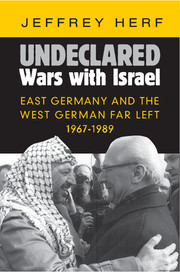Book contents
- Frontmatter
- Dedication
- Contents
- Preface
- Acknowledgments
- Abbreviations
- 1 Introduction
- 2 East Germany and the Six-Day War of June 1967
- 3 An anti-Israeli Left Emerges in West Germany: The Conjuncture of June 1967
- 4 Diplomatic Breakthrough to Military Alliance: East Germany, the Arab States, and the PLO: 1969–1973
- 5 Palestinian Terrorism in 1972: Lod Airport, the Munich Olympics, and Responses
- 6 Formalizing the East German Alliance with the PLO and the Arab States: 1973
- 7 Political Warfare at the United Nations During the Yom Kippur War of 1973
- 8 1974: Palestinian Terrorist Attacks on Kiryat Shmona and Ma'alot and Responses in East Germany, West Germany, Israel, the United States, and the United Nations
- 9 The United Nations “Zionism Is Racism” Resolution of November 10, 1975
- 10 The Entebbe Hijacking and the West German “Revolutionary Cells”
- 11 An Alliance Deepens: East Germany, the Arab states, and the PLO: 1978–1982
- 12 Terrorism from Lebanon to Israel's “Operation Peace for Galilee”: 1977–1982
- 13 The Israel-PLO War in Lebanon of 1982
- 14 Loyal Friends in Defeat: 1983–1989 and After
- 15 Conclusion
- Bibliography
- Index
5 - Palestinian Terrorism in 1972: Lod Airport, the Munich Olympics, and Responses
Published online by Cambridge University Press: 05 June 2016
- Frontmatter
- Dedication
- Contents
- Preface
- Acknowledgments
- Abbreviations
- 1 Introduction
- 2 East Germany and the Six-Day War of June 1967
- 3 An anti-Israeli Left Emerges in West Germany: The Conjuncture of June 1967
- 4 Diplomatic Breakthrough to Military Alliance: East Germany, the Arab States, and the PLO: 1969–1973
- 5 Palestinian Terrorism in 1972: Lod Airport, the Munich Olympics, and Responses
- 6 Formalizing the East German Alliance with the PLO and the Arab States: 1973
- 7 Political Warfare at the United Nations During the Yom Kippur War of 1973
- 8 1974: Palestinian Terrorist Attacks on Kiryat Shmona and Ma'alot and Responses in East Germany, West Germany, Israel, the United States, and the United Nations
- 9 The United Nations “Zionism Is Racism” Resolution of November 10, 1975
- 10 The Entebbe Hijacking and the West German “Revolutionary Cells”
- 11 An Alliance Deepens: East Germany, the Arab states, and the PLO: 1978–1982
- 12 Terrorism from Lebanon to Israel's “Operation Peace for Galilee”: 1977–1982
- 13 The Israel-PLO War in Lebanon of 1982
- 14 Loyal Friends in Defeat: 1983–1989 and After
- 15 Conclusion
- Bibliography
- Index
Summary
On May 30, 1972, three members of the Japanese Red Army, a terrorist offshoot of the Japanese New Left, arrived at Lod Airport in Tel Aviv on Air France flight 132 on the Paris–Rome–Tel Aviv route. In the airport's baggage claim area, they retrieved Kalashnikov assault rifles and hand grenades concealed in their luggage, opened fire, and threw the hand grenades at passengers in the baggage waiting area. They killed 25 people, most of them tourists from Costa Rica, and wounded 78 people in all. One of the terrorists was captured. Two were killed, one accidentally shot by his colleague, the other after landing on a hand grenade. An Israeli journalist wrote, “The scene here at Lod Airport is like after a pogrom. Broken glass panes, doors riddled with bullet holes and blood patches on every side.” The attack was coordinated with the Popular Front for the Liberation of Palestine (PFLP). Aside from the destruction of the Swissair flight in 1970 that claimed 47 lives, the Lod Airport attack was the worst single attack in Israel in the post-1967 terrorist campaign carried out by a member organization of the PLO's Executive Committee.
In her speech to the Knesset about the previous day's “wicked act of murder,” Israeli prime minister Golda Meir spoke caustically about “the so-called war of liberation the terrorist organizations are waging…. Woe to any revolution, local or global, which is built on blood and murder, conducted in the name of murder. Immediately after they heard of last night's incident, both Cairo and Beirut hailed a great victory. Scores of people were killed and wounded. And their joy knows no bounds.” Judging from the broadcasts of the PLO following the attack, Meir's comment that “their joy knows no bounds” was on the mark. A political culture that celebrated terrorist attacks on Israel was fully in evidence. On May 31, 1972, the BBC monitoring service recorded the following broadcast on Voice of Fatah radio in Arabic in Cairo regarding the Lod massacre:
(i) The great, humane, revolutionary choice by a group of youths [the members of the Japanese Red Army, JH] who were born thousands of miles from Palestine demonstrates the greatness of these youths, which is equal to the justness of the Palestine cause. It also indicates the position our cause occupies on the world level.
- Type
- Chapter
- Information
- Undeclared Wars with IsraelEast Germany and the West German Far Left, 1967–1989, pp. 158 - 197Publisher: Cambridge University PressPrint publication year: 2016

